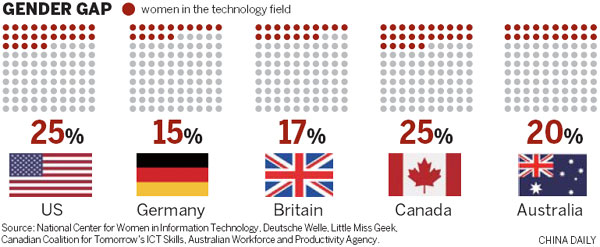Reprogramming gender ratios in Malaysia's IT
Updated: 2013-09-01 10:11
By Ellen Chen (China Daily)
|
|||||||||||

Women who left careers to raise families are especially attracted to the opportunities to work from home.
The practice is more common among multinationals than local, and small and medium-sized, enterprises. Eight of 21 companies at Kuala Lumpur's recent flexFair job fair are from the ICT sector.
Jobstreet Malaysia's country manager Chook Yuh Yng expects more women to enter the sector since they account for more than half of graduates.
"Nowadays, employers are less discriminative and more progressive," she says. "They hire any gender as long as they're qualified, skilled and can get the job done."
CEO of The Media Shoppe, one of Malaysia's leading Internet companies, Christopher Chan says the country faces a shortage of skilled developers.
"About 30 percent of our workforce for TMS Software are technical staff, and involve coding in some form. However, we don't seem to have many programmers who are women. I guess it's because sometimes the job requires us to travel," he says.
"We do have a few women developers in very key positions. But recently we seem to be hiring more men, as there are frequent needs to travel."
Chan says his wife graduated with a bachelor's degree in computer engineering and a master's in industrial engineering and was the company's CTO. She later took a lesser role so she could focus on the family.
"Students today are more interested in the social sciences rather than computer engineering," Chan says. "Most companies, when they get an opportunity to interview a good programmer, will hire regardless of gender. I find women developers to be more patient and steadier, whereas men tend to get bored easily."
Woon from PIKOM says: "A key trend in tech development is big data analytics, which are deployed by various industries to better serve customers by culling out insights and predictions that the data can generate. The characteristics of being detailed and sensible in women would help in filling the consumers' wants and needs for usability, convenience, productivity and social connectivity."
ICT growth produces opportunity, he says.
"Our ICT Job Market Outlook 2013 (report's) research shows the industry is expected to grow at 10 percent for 2013 a consistent growth (rate) over the past five years," Woon says.
"The average monthly salary for ICT professionals across the board is increasing every year as tabulated in the report. The average monthly (pay) for an ICT professional in 2012 was MYR 6,784 ($2,055), representing an increase of 8.7 percent from MYR 6,240 in 2011. This increase was well above the average inflation rate of 3.2 percent in 2011 and 1.6 percent in 2012."
Related Stories
Women work alongside men at checkpoints 2013-08-06 08:15
Tibet women account for 37% of workforce 2013-07-16 21:47
Today's Top News
Obama delays Syria strike to seek Congress approval
Obama seeking lawmakers' OK for Syria strike
Education can boost economy: Li
Liquid ammonia leak kills at least 15
Liquid ammonia leak kills 15 in Shanghai
5.9-magnitude quake jolts SW China
Economic slowdown, railways hold back airlines
US says 1,429 killed in Aug. 21 chemical attack
Hot Topics
Lunar probe , China growth forecasts, Emission rules get tougher, China seen through 'colored lens', International board,
Editor's Picks

|

|

|

|

|

|





